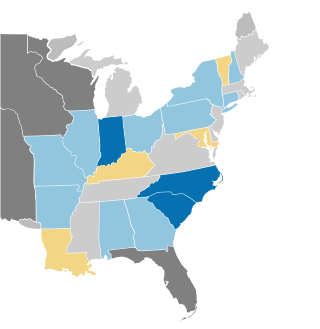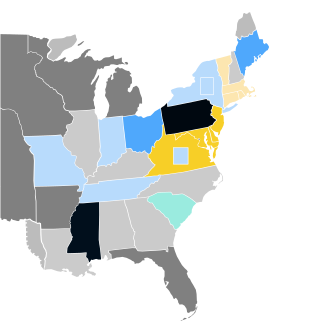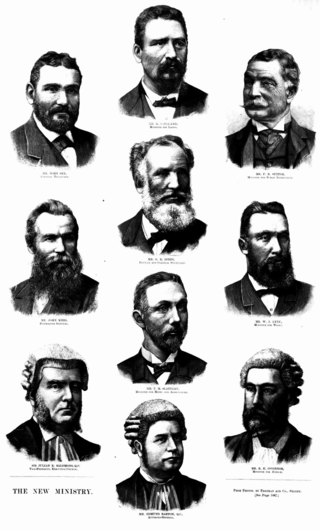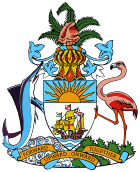
This section of the Timeline of Quebec history concerns the events in British North America relating to what is the present day province of Quebec, Canada between the time of the Constitutional Act of 1791 and the Act of Union 1840.

The Illinois House of Representatives is the lower house of the Illinois General Assembly. The body was created by the first Illinois Constitution adopted in 1818. The House under the current constitution as amended in 1980 consists of 118 representatives elected from individual legislative districts for two-year terms with no limits; redistricted every 10 years, based on the 2010 U.S. census each representative represents approximately 108,734 people.

John Breathitt was an American politician and lawyer who was the 11th Governor of Kentucky. He was the first Democrat to hold this office and was the second Kentucky governor to die in office. Shortly after his death, Breathitt County, Kentucky was organized and named in his honor.

New York's 3rd congressional district is a congressional district for the United States House of Representatives in the State of New York. It is represented by Democrat Tom Suozzi, after a special election was held on February 13, 2024, to replace expelled Republican George Santos. The election was called for Suozzi by the Associated Press about an hour after the polls closed.

The Parliament of The Bahamas is the bicameral national parliament of the Commonwealth of The Bahamas. The parliament is formally made up of the sovereign, an appointed Senate, and an elected House of Assembly. It currently sits at the Bahamian Parliament Building in Nassau, the national capital.

The House of Assembly is the lower house of the Parliament of the British Overseas Territory of Bermuda. The house has 36 Members of Parliament (MPs), elected for a term of five years in single seat constituencies using first-past-the-post voting. Bermuda now has universal voting with a voting age of 18 years. Voting is non-compulsory. The presiding officer of the House is called the Speaker.

The House of Assembly of the British Virgin Islands, until 2007 known as the Legislative Council, has 15 members: 13 directly elected for four-year terms, and two ex officio members.

The results of elections in the state of New York have tended to be more Democratic-leaning than in most of the United States, with in recent decades a solid majority of Democratic voters, concentrated in New York City and some of its suburbs, including Westchester County, Rockland County and Long Island's Nassau county, and in the cities of Buffalo, Rochester, Syracuse, Albany, and Ithaca.

The 1876 South Carolina gubernatorial election was held on November 7, 1876, to select the governor of the state of South Carolina. The election campaign was a referendum on the Radical Republican-led state government and their Reconstruction policies. Opponents disputed the challenger Wade Hampton III's victory, gained by a margin of little more than 1100 votes statewide. But he took office in April 1877, after President Hayes withdrew federal troops as a result of a national Democratic compromise, and the incumbent Daniel Henry Chamberlain left the state.
Sir Henry Milton Taylor was the fourth governor-general of the Bahamas, serving from February 28, 1991, to January 2, 1992.

The 1908 New York state election was held on November 3, 1908, to elect the governor, the lieutenant governor, the Secretary of State, the state comptroller, the attorney general, the state treasurer, the state engineer and a judge of the New York Court of Appeals, as well as all members of the New York State Assembly and the New York State Senate.

The 2003 United States elections, most of which were held on Tuesday, November 4, were off-year elections in which no members of the Congress were standing for election. However, there were three gubernatorial races, state legislative elections in four states, numerous citizen initiatives, mayoral races in several major cities, and a variety of local offices on the ballot.
Since the Great Depression, Rhode Island politics have been dominated by the Rhode Island Democratic Party, and the state is considered part of the Democrats' "Blue Wall." Democrats have won all but four presidential elections since 1928, with the exceptions being 1952, 1956, 1972, and 1984. The Rhode Island Republican Party, although virtually non-existent in the Rhode Island General Assembly, has remained competitive in gubernatorial elections, having won one as recently as 2006. Until 2014, Democrats had not won a gubernatorial election in the state since 1992, and it was not until 2018 that they won one by double digits. The Rhode Island General Assembly has continuously been under Democratic control since 1959.

The 1842–43 United States Senate elections were held on various dates in various states. As these U.S. Senate elections were prior to the ratification of the Seventeenth Amendment in 1913, senators were chosen by state legislatures. Senators were elected over a wide range of time throughout 1842 and 1843, and a seat may have been filled months late or remained vacant due to legislative deadlock. In these elections, terms were up for the senators in Class 3.

The 1832–33 United States Senate elections were held on various dates in various states. As these U.S. Senate elections were prior to the ratification of the Seventeenth Amendment in 1913, senators were chosen by state legislatures. Senators were elected over a wide range of time throughout 1832 and 1833, and a seat may have been filled months late or remained vacant due to legislative deadlock. In these elections, terms were up for the senators in Class 1.

The third Dibbs ministry, the 27th ministry of the Colony of New South Wales, was led by Sir George Dibbs, leader of the Protectionist Party, following the 1891 New South Wales election, which saw the Labour Party win seats in the New South Wales Legislative Assembly and the balance of power. With no party having a majority, Sir Henry Parkes held on as Premier until October 1891 when he lost a vote in the Legislative Assembly, causing Parkes to resign as Premier and leader of the Free Trade Party. Dibbs formed the ministry on 23 October 1891, with Labour support, and comprised 10 ministers.
The members of the 1st General Assembly of Newfoundland were elected in the Newfoundland general election held in November 1832, the first general election for the colony. The general assembly sat from January 1, 1833 until 1836.

General elections were held in the Bahamas in September 1729, the first elections in the territory.
Dame Doris Sands Johnson was a Bahamian teacher, suffragette, and politician. She was the first Bahamian woman to contest an election in the Bahamas, the first female Senate appointee, and the first woman granted a leadership role in the Senate. Once in the legislature, she was the first woman to be made a government minister and then was elected as the first woman President of the Senate. She was the first woman to serve as Acting Governor General of the Bahamas, and was honored as Dame Commander of the Most Excellent Order of the British Empire by Queen Elizabeth II.
Ruby Ann Cooper-Darling is a Bahamian politician and stateswoman.














